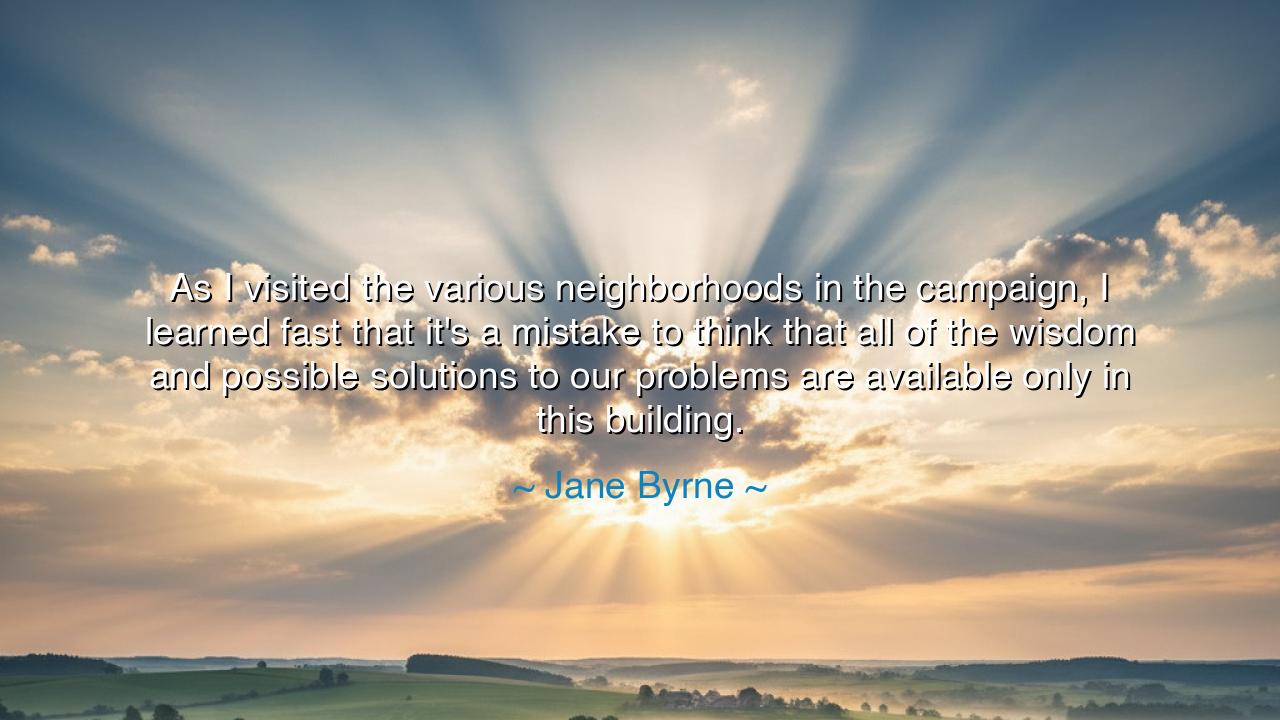
As I visited the various neighborhoods in the campaign, I
As I visited the various neighborhoods in the campaign, I learned fast that it's a mistake to think that all of the wisdom and possible solutions to our problems are available only in this building.






Listen, O seekers of counsel, to the words of Jane Byrne, who walked among the people and discovered a profound truth: that wisdom and the seeds of solutions are not confined to the towering halls of power. As she wandered through the neighborhoods of her city, she realized that the problems of the people, though often presented to the leaders in stately chambers, are best understood by those who dwell amidst them. Herein lies the teaching: true insight arises not from isolation, but from engagement with the lives and experiences of the common folk.
The origin of Byrne’s words is found in her path as the first female mayor of Chicago, a pioneer in governance who sought to transform civic leadership. During her campaign, she ventured into districts often ignored, listening to voices that echoed with urgent needs, unrecognized by bureaucratic deliberations. In these journeys, she discovered that practical solutions emerge not solely from decrees or council chambers, but from the lived knowledge of the populace—a wisdom cultivated in streets, homes, and workplaces, beyond the confines of official authority.
The meaning of this reflection extends beyond politics into the nature of human understanding itself. It teaches that arrogance of thought, the belief that all answers reside within the fortress of office or the library of scholars, blinds the seeker to the riches that lie in the hearts of ordinary people. Knowledge is not a treasure hoarded by the powerful; it flows in the lived experiences, observations, and practical intelligence of the many. To govern well, or to act wisely, one must first listen, witness, and learn from the world outside one’s walls.
History provides clear testament to this truth. Consider Abraham Lincoln, who walked among the people and conversed with farmers, tradesmen, and soldiers alike, understanding that the pulse of the nation beats strongest in its common folk. By listening and engaging, he gained insights that shaped policies and preserved a nation. Byrne’s experience echoes this eternal lesson: the wisdom of the people is a wellspring, often untapped by those who dwell only within the cloisters of power.
Moreover, this teaching illuminates the path for all leaders, scholars, and those who would seek solutions. It exhorts us to step beyond familiar chambers, to encounter perspectives and experiences that challenge our assumptions, and to recognize that truth is not owned by the few but discovered collectively. In doing so, we cultivate humility, deepen understanding, and summon practical wisdom that can bring about meaningful change.
Let the generations who follow carry Byrne’s lesson as a torch: the answers to human challenges are scattered in the world, awaiting those who approach with curiosity, respect, and openness. Those who confine themselves to their own edifice of thought risk stagnation, while those who venture into the lived reality of others find the guidance and insight necessary to illuminate the path for all. True leadership, like true wisdom, flows outward, embracing the voices of the many, and transforming them into the solutions of tomorrow.






MYMoto Yugi
Reading this, I feel both enlightened and challenged. It suggests that effective leadership requires stepping out of one’s office and engaging with lived experiences. I wonder how many systemic problems persist because policymakers fail to look beyond their immediate environment. Could this approach of listening to local knowledge create more sustainable and practical solutions, and if so, why isn’t it more universally embraced in governance and organizational decision-making?
TL24 - Khieu Tung Lam
This statement provokes a proactive question: if wisdom exists beyond official institutions, how can leaders systematically gather and incorporate it? I’m curious about mechanisms like town halls, participatory budgeting, or community councils—do these tools actually capture meaningful input, or are they often symbolic? It also makes me reflect on the broader challenge of ensuring that diverse perspectives are heard and acted upon, rather than relying solely on the views of a centralized authority.
MMiu
I feel inspired by this perspective because it highlights humility and openness in leadership. Recognizing that solutions can come from neighborhoods and local experience is a powerful reminder that expertise is not limited to formal positions. But it also makes me question how often bureaucracies resist input from outside their walls and whether structural barriers prevent this kind of community-informed problem-solving in practice.
GDGold D.dragon
This quote makes me think about the importance of listening to communities directly rather than relying solely on top-down decision-making. It raises the question: how often do policymakers assume solutions exist only within their offices instead of engaging with the people affected by their decisions? I also wonder whether this insight applies beyond politics—could businesses, schools, and organizations benefit similarly from seeking wisdom outside their usual circles?